Mellite Value, Price, and Jewelry Information
Mellite is a rare and unusual organic gemstone. Although soft and fragile, the “honey stone” is quite beautiful when cut.
2 Minute Read
Mellite is a rare and unusual organic gemstone. Although soft and fragile, the “honey stone” is quite beautiful when cut.
Start an IGS Membership today
for full access to our price guide (updated monthly).Mellite Value
How Does "Honey Stone" Form?
Like its namesake, mellite occurs in attractive yellow, reddish, and brownish colors. Occasionally, white specimens also emerge. Some cut specimens can show a high degree of transparency.
Like pearls and coral, mellites are organic gemstones. However, mellite's formation doesn't involve living organisms. It forms via an inorganic process, in association with lignite (brown coal), from compressed decayed plant matter and aluminum.
How to Identify Mellite
In addition to its unusual origins, mellites have a number of interesting properties.
Hardness and Tenacity
With a very low hardness of 2 to 2.5, mellites can be scratched by a copper coin. These gems are also sectile, which means you could cut them with a knife. Of course, conduct a scratch test only as a last resort for identification and never on a finished gem.
Electrical Properties
Mellite crystals also exhibit the pyroelectric effect. They generate an electric current when heated.
Optics
Although mellites have a uniaxial optic character, anomalously biaxial specimens may occur.
Fluorescence
- Dull white or medium light blue fluorescence in shortwave (SW) ultraviolet light (UV).
- Lemon yellow in longwave (LW) UV. German material may fluoresce medium light blue.
- Russian material may fluoresce weak brown in SW UV.
How Mellites Differ from Cinnabar, Amber, and Ulexite
Few well-known gems with mellite's color range and hardness are likely to be confused with it.
Cinnabar has a similar hardness but a far higher specific gravity (SG).
Amber and ulexite have hardness and SG values close to mellite. However, these gems differ optically. Amorphous amber has no birefringence. While fibrous ulexite is birefringent, cut specimens usually showcase a cat's eye or the unusual "TV effect." Mellites don't display these effects.
Are There Any Synthetic Mellites?
Scientists have synthesized mellite for research into geochemistry. However, there is no known use of this material for jewelry purposes.
Although you might find "synthetic" mellites for sale online, these materials are, strictly speaking, simulants or imitations, most likely glass. While gemologists distinguish between synthetics and simulants, these words both carry strong connotations of "fakeness" in everyday usage. Thus, people often use the terms synonymously.
Enhancements
No known gem treatments.
Mellite Sources
Only a few locations produce mellites, and most gem-quality material comes from the Csordakúti mine in the Bicske-Zsámbéki Basin, Hungary. Other notable sources include the following:
- Bohemia and Moravia, Czech Republic
- Paris Basin, France
- Artern (type locality) and Bitterfeld, Germany
- Tula, Tul'skaya Oblast', Russia
Mellite Stone Sizes
Mellites almost always weigh in on the small side, from 1 to 3 carats.
Caring for Mellite Jewelry and Carvings
Mellite would make a challenging jewelry stone. Reserve any pieces for occasional wear, use protective settings, and avoid impacts. Store them separately from other harder jewelry stones to prevent contact scratches.
Carvings and other decorative objects are less likely to suffer contact damage. However, resist the urge to just wipe dust off any pieces made from mellites. With a hardness of 7, household dust will easily scratch this material. Clean mellites only with a soft brush, mild detergent, and warm water. Consult our gemstone jewelry cleaning guide for more recommendations.
Joel E. Arem, Ph.D., FGA
Dr. Joel E. Arem has more than 60 years of experience in the world of gems and minerals. After obtaining his Ph.D. in Mineralogy from Harvard University, he has published numerous books that are still among the most widely used references and guidebooks on crystals, gems and minerals in the world.
Co-founder and President of numerous organizations, Dr. Arem has enjoyed a lifelong career in mineralogy and gemology. He has been a Smithsonian scientist and Curator, a consultant to many well-known companies and institutions, and a prolific author and speaker. Although his main activities have been as a gem cutter and dealer, his focus has always been education. joelarem.com
International Gem Society
Related Articles
Black Diamond Value, Price, and Jewelry Information
Chameleon Diamond Value, Price, and Jewelry Information
Gray Diamond Value, Price, and Jewelry Information
Green Diamond Value, Price, and Jewelry Information
Latest Articles
800 Years of Mogok: A Celebration in Tenuous Times
What is the Average Gemstone Faceting Yield?
Pyroxmangite Value, Price, and Jewelry Information
How to Identify Emerald Simulants and Synthetics
Never Stop Learning
When you join the IGS community, you get trusted diamond & gemstone information when you need it.
Get Gemology Insights
Get started with the International Gem Society’s free guide to gemstone identification. Join our weekly newsletter & get a free copy of the Gem ID Checklist!
